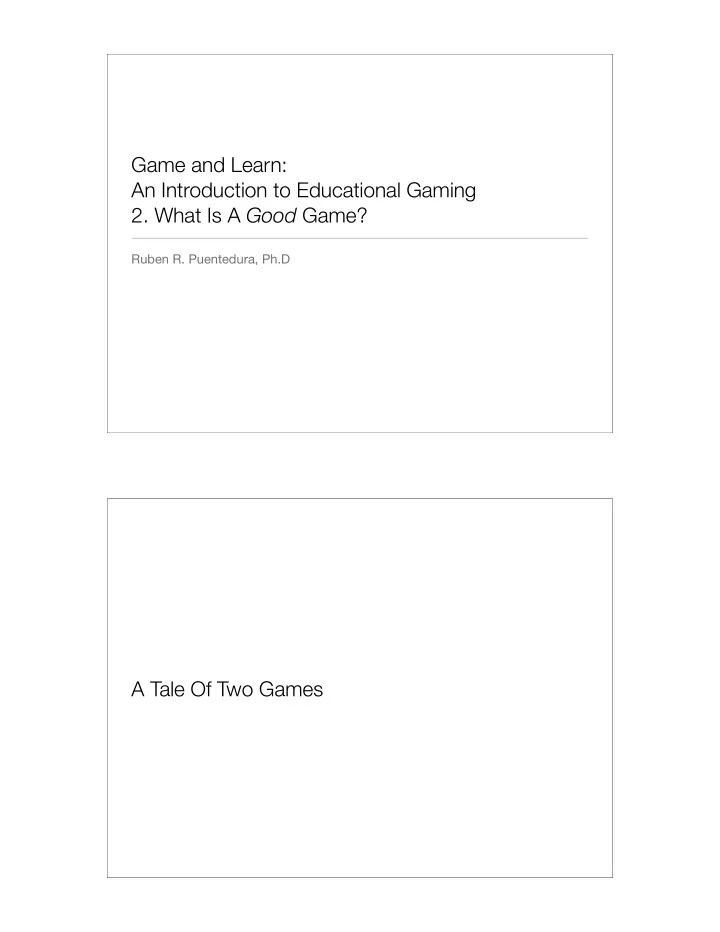

Game and Learn: An Introduction to Educational Gaming 2. What Is A Good Game? Ruben R. Puentedura, Ph.D A Tale Of Two Games
One of The Best Videogames of All Time: Pitfall! One of The Worst Videogames of All Time: ET
What Makes a Game Fun? Games and Boredom When Players Say… …They Mean The game is too easy Game patterns are too simple Players are uninterested in the The game is too involved information required to detect patterns The game is too hard Patterns are perceived as noise The game becomes too repetitive New patterns are added too slowly The game becomes too hard New patterns are added too fast The game runs out of options All game patterns are exhausted
Games and Boredom When Players Say… …They Mean The game is too easy Game patterns are too simple Players are uninterested in the The game is too involved information required to detect patterns The game is too hard Patterns are perceived as noise The game becomes too repetitive New patterns are added too slowly The game becomes too hard New patterns are added too fast The game runs out of options All game patterns are exhausted
Games and Boredom When Players Say… …They Mean The game is too easy Game patterns are too simple Players are uninterested in the The game is too involved information required to detect patterns The game is too hard Patterns are perceived as noise The game becomes too repetitive New patterns are added too slowly The game becomes too hard New patterns are added too fast The game runs out of options All game patterns are exhausted Successful Games Include These Items… …To Avoid Preparation before challenges Results due to pure chance A sense of a game space The perception of the game as trivial The game not being perceived as a A solid core mechanic game at all The game being exhausted too A range of challenges quickly The game being perceived as A range of required abilities simplistic Skill in using the required abilities The game being perceived as tedious
Successful Games Include These Items… …To Avoid Preparation before challenges Results due to pure chance A sense of a game space The perception of the game as trivial The game not being perceived as a A solid core mechanic game at all The game being exhausted too A range of challenges quickly The game being perceived as A range of required abilities simplistic Skill in using the required abilities The game being perceived as tedious
Successful Games Include These Items… …To Avoid Preparation before challenges Results due to pure chance A sense of a game space The perception of the game as trivial The game not being perceived as a A solid core mechanic game at all The game being exhausted too A range of challenges quickly The game being perceived as A range of required abilities simplistic Skill in using the required abilities The game being perceived as tedious
Three More Key Items for Success You Need to Have… …Because Players like to see greater skill result in Variable feedback greater rewards A way to accommodate beginners You don’t want to see beginners get and experts playing together clobbered, and experts “bottom feed” Players feel cheated by “never-lose” A definite cost for failure games Exercise: Good & Bad Games • Good Games: • Pitfall! (Atari 2600) • Aladdin (SNES) • Super Mario 64 (N64) • Bad Games: • E.T. (Atari 2600) • Captain Novolin (SNES) • Superman 64 (N64)
Resources Cited • What Makes a Game Fun: •Koster, R. Theory of Fun for Game Design . Paraglyph. (2004)
Hippasus http://hippasus.com/rrpweblog/ rubenrp@hippasus.com This work is licensed under a Creative Commons Attribution-Noncommercial-Share Alike 3.0 License.
Recommend
More recommend